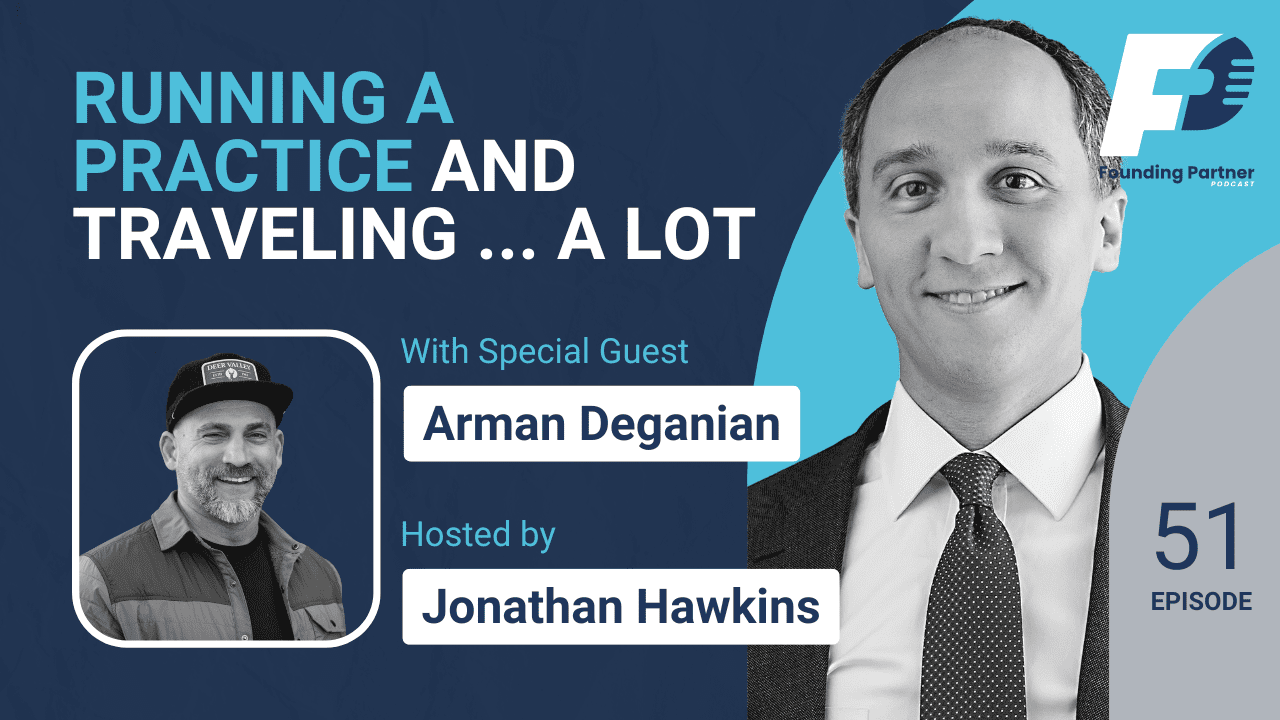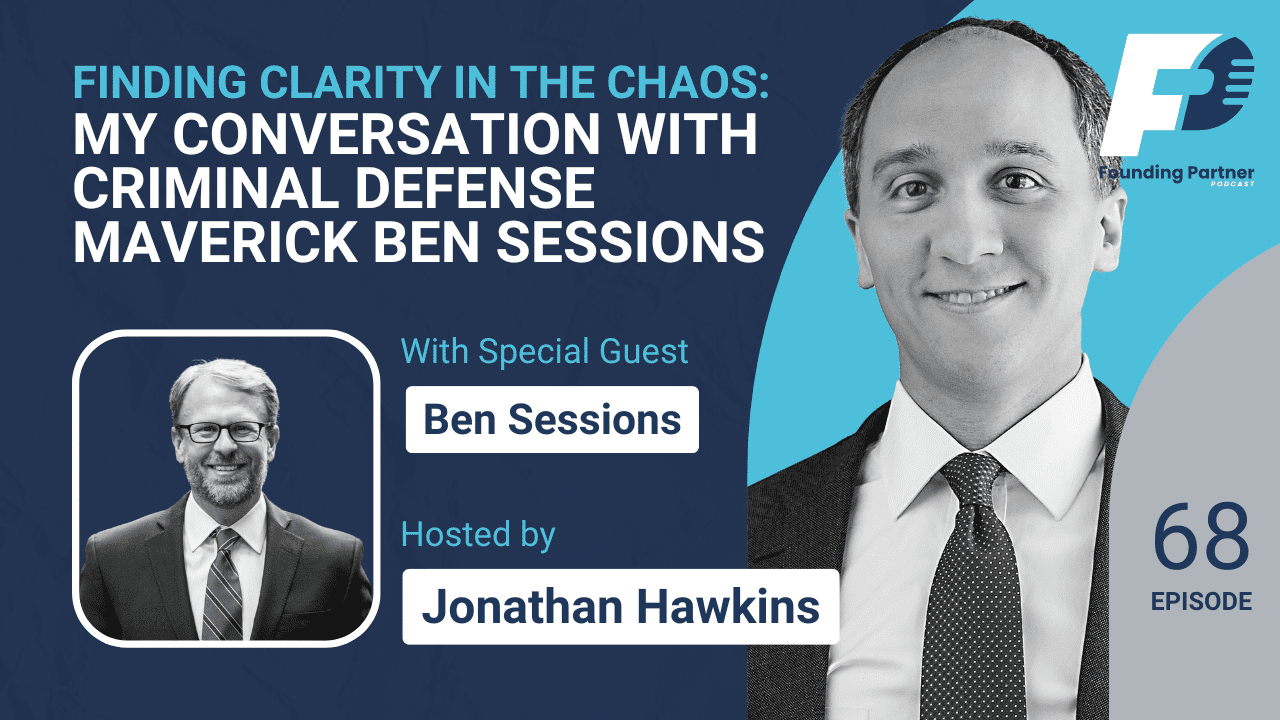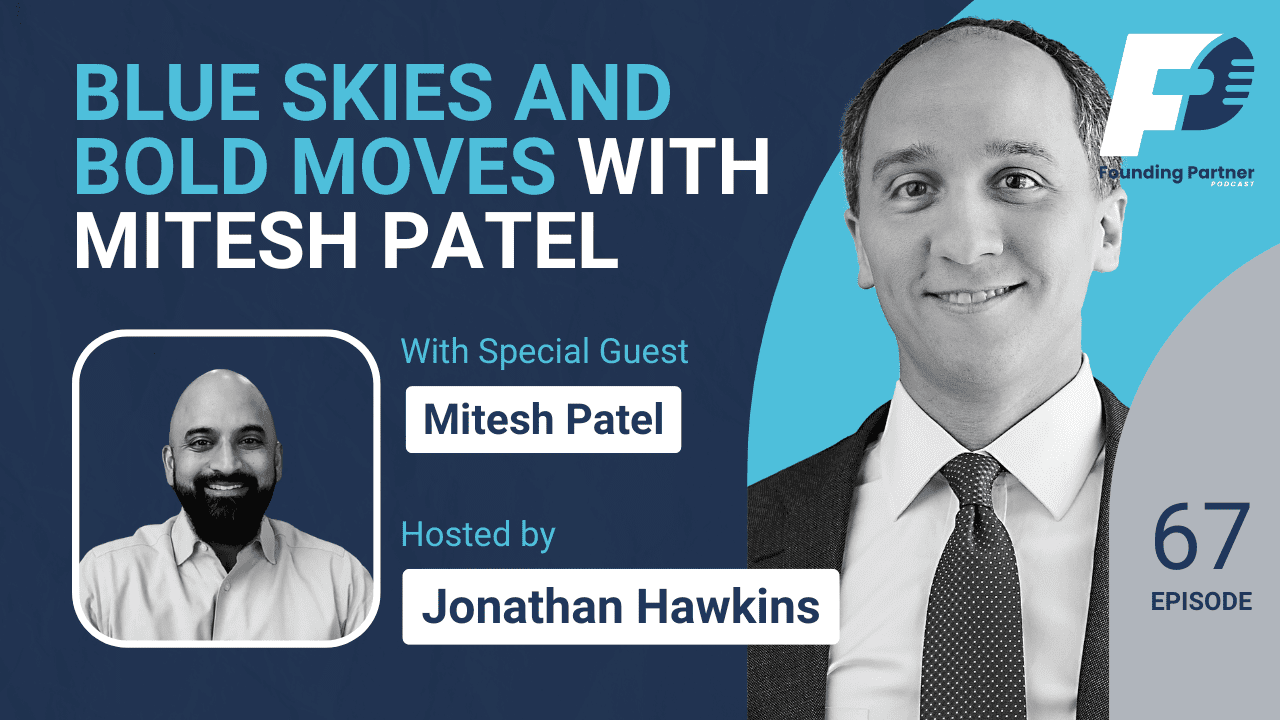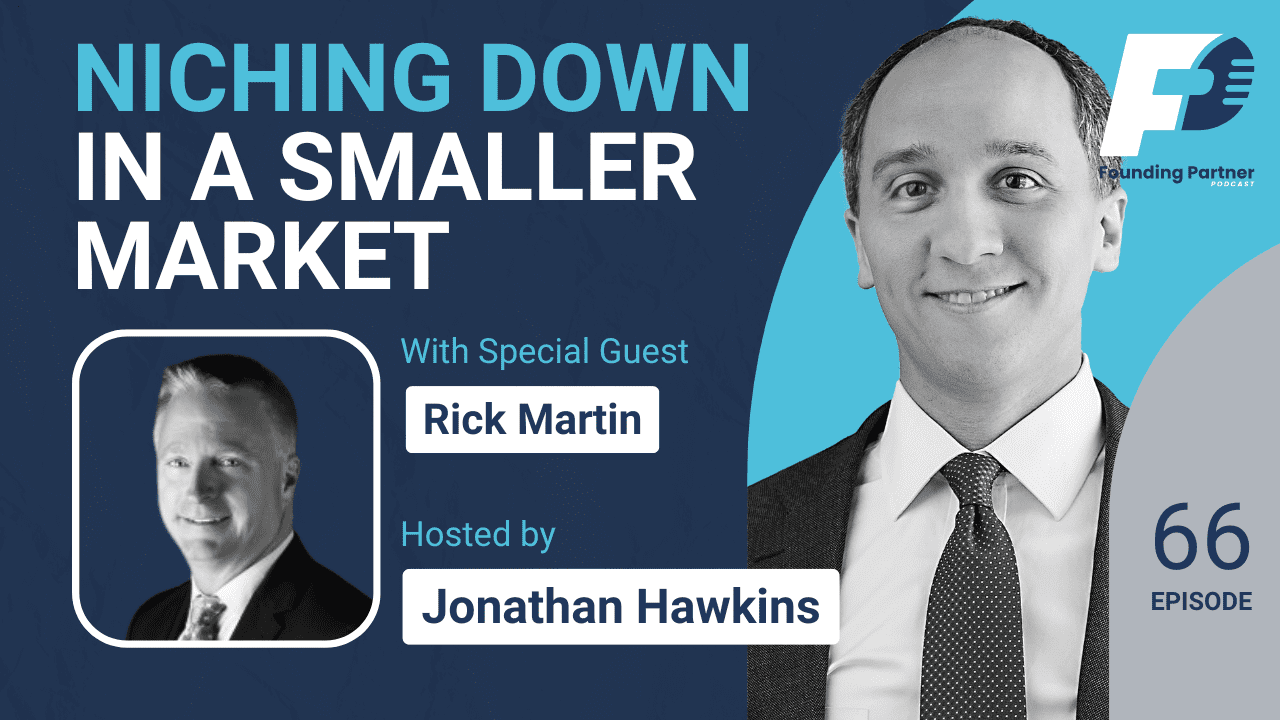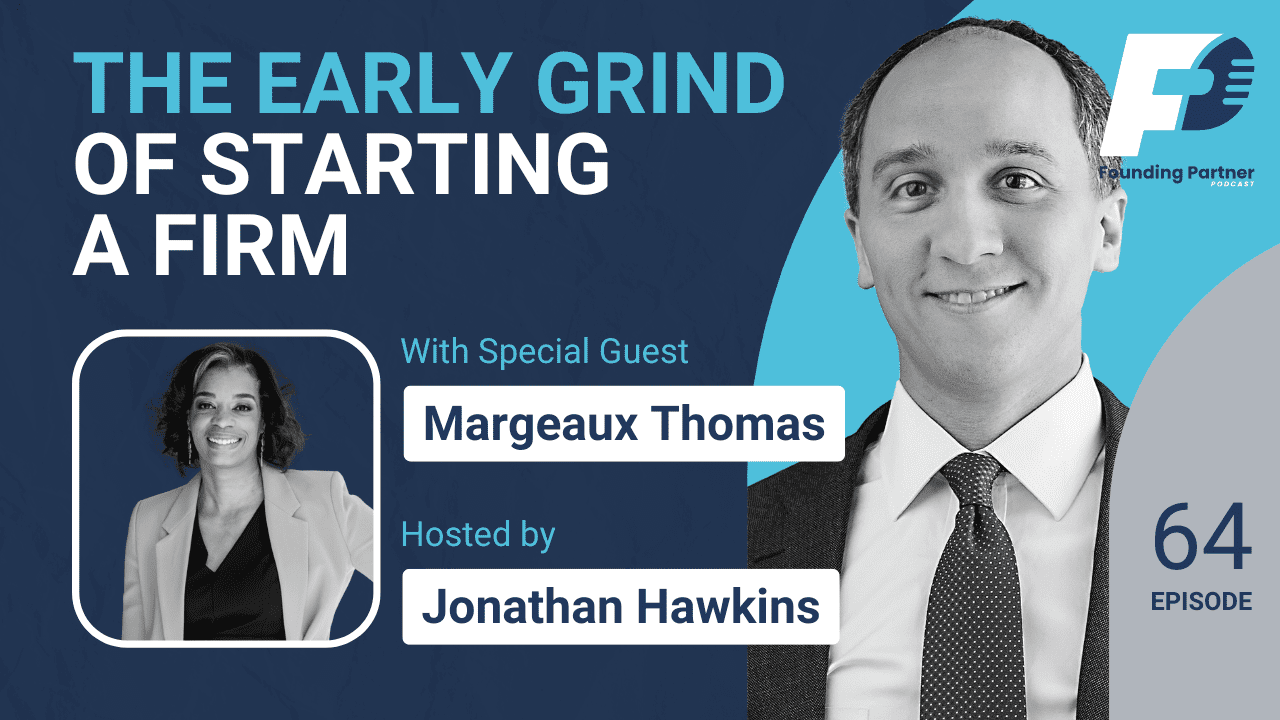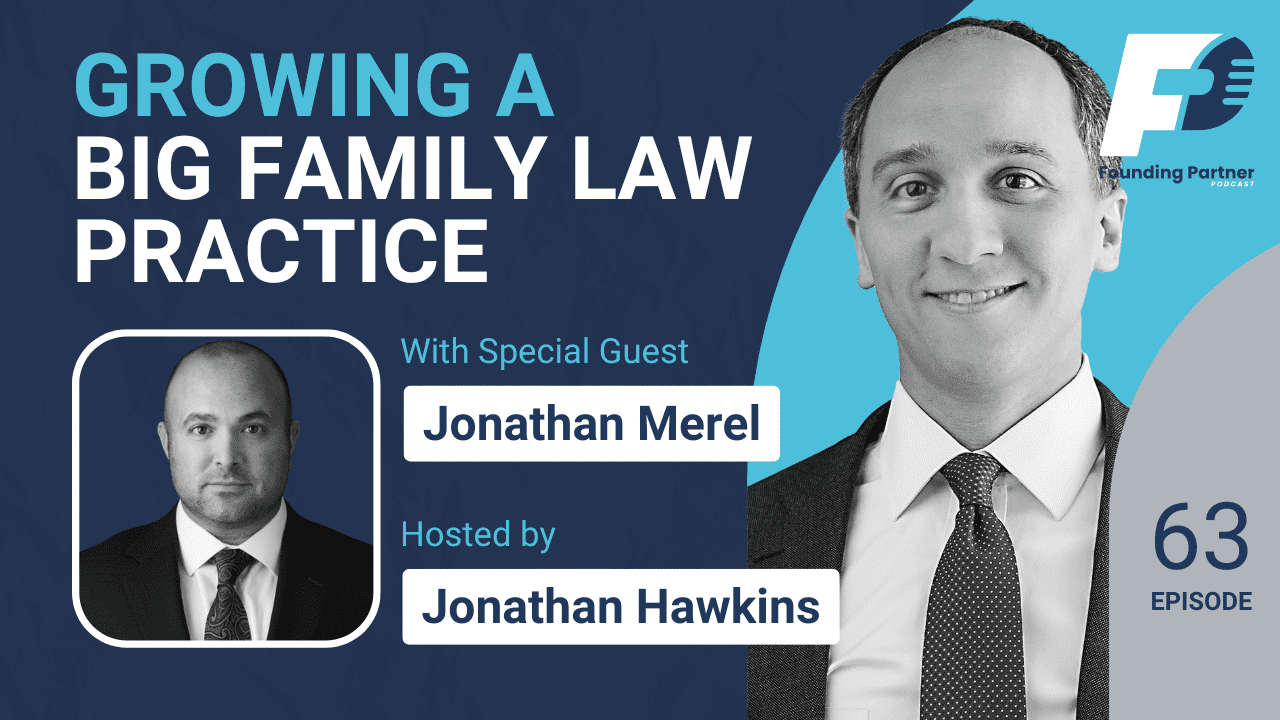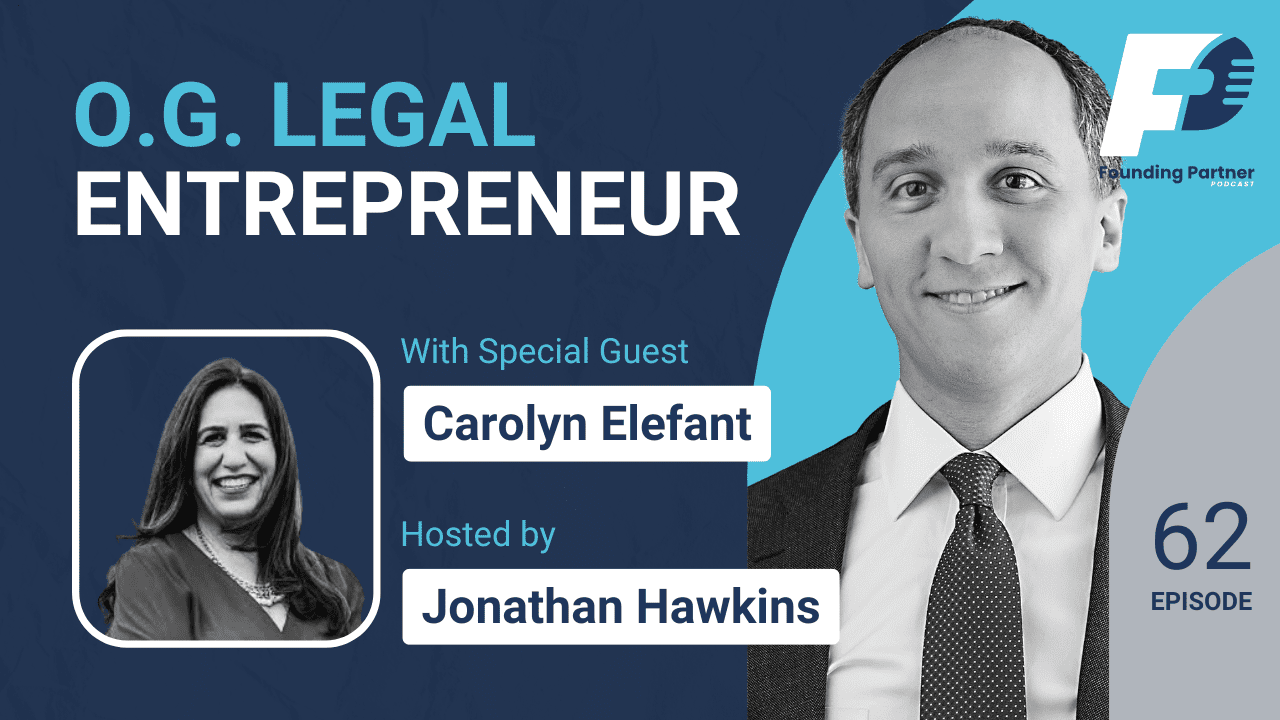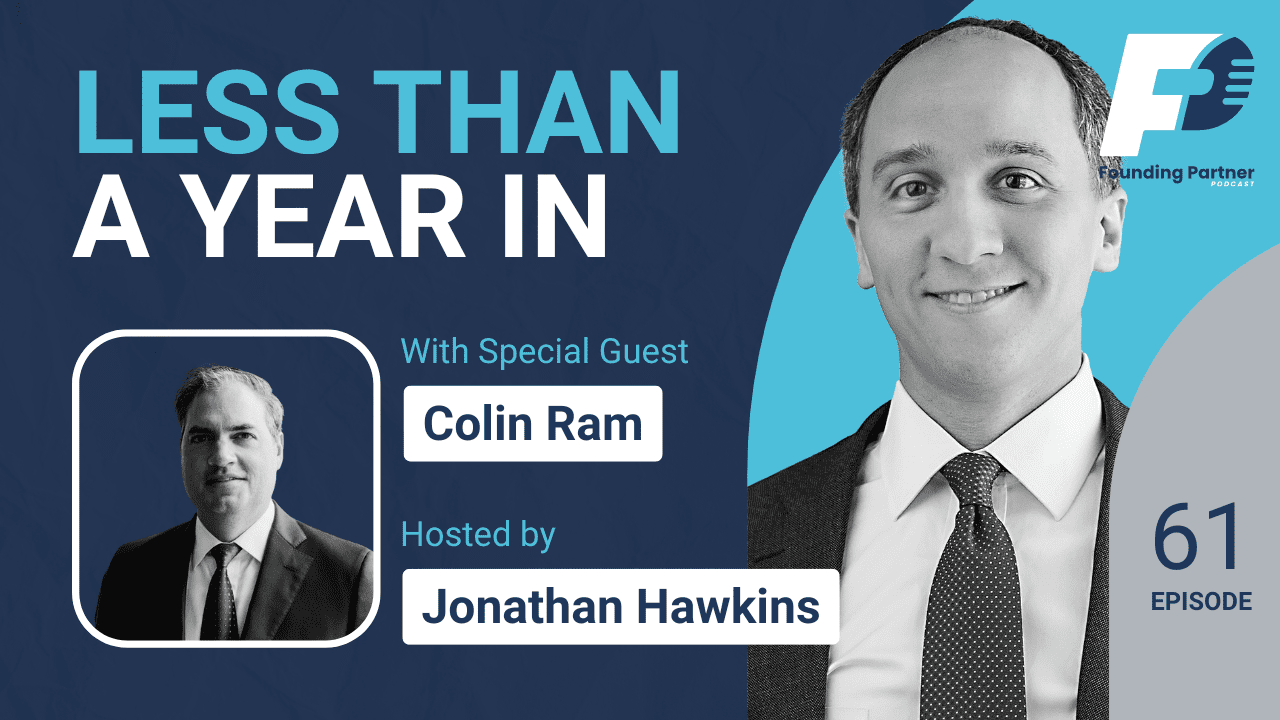Jonathan Hawkins: [00:00:00] I’m your host, Jonathan Hawkins. Excited about the guest today, one of my longtime friends. We were section mates way back in the day in law school. I was thinking about that. It’s about 24 years ago now when we started, Arman. So, today’s guest is Arman Deganian. He’s a plaintiff’s personal injury lawyer here in the Atlanta area. Although he splits time, he’s not always here in Atlanta. So, Arman, why don’t you introduce yourself and tell us about your firm and what you do?
Arman Deganian: Yeah. As you alluded to, I graduated law school in 2003. So, I’ve been coming up on, what? This will be 20 years in a row that we’ve been practicing. Founding partner of Lintner + Deganian. My partner, Steve Lintner, we do, primarily, auto trucking personal injury work. We do litigation, we focus on your mid to high-value range cases, and if we have to file them, we’ll file them. We have about 30 employees, 8 attorneys right now within our firm, and [00:01:00] offices in Atlanta, outside of Savannah, and Columbus, Georgia.
Jonathan Hawkins: Man, I didn’t know you had all those offices. It’s been a while since we’ve talked. I didn’t know you had that many employees. I remember way back in the day when you guys started. You’ve come a long way, that’s awesome.
Arman Deganian: Yeah, good and bad. There’s a lot of growing pains, obviously, as you probably see. With the growth and scaling, it’s generally been our biggest challenge is, figuring out where we want it, and trying to do it purposefully, and cases, and then trying to figure out how to handle them, malpracticing.
Jonathan Hawkins: Yeah. So, I know you guys bought that building a while back. Have you outgrown that building?
Arman Deganian: So, we were about to, we did some renovations, we expanded the parking lot right by Emory on Briarcliff Road. We were about to look at either expanding it or buying it, and COVID happened. Still, we offer our employees remote working.
So, we never undertook to make folks come back, aside from when we have a new employee, we’d like to train them. Once they approve to work remotely, we almost prefer that because we think it gives a better quality of life. They don’t have to drive into [00:02:00] Atlanta. Thankfully, we don’t fit in there right now.
Jonathan Hawkins: Yeah. I used to live over there, near Emory. And it is just hard to get in and out of there.
Arman Deganian: Where are you guys now?
Jonathan Hawkins: North Buckhead, basically.
Arman Deganian: Okay.
Jonathan Hawkins: Live and work over there. Years out of town to North Buckhead is, there’s no good way, man, it’s tough. Let’s go all the way back to law school. It’s crazy, we started, I guess, in August of 2000. Why did you go to law school? I know your dad’s a doctor. Why did you do law school?
Arman Deganian: I just didn’t know what to do, that’s the honest answer. I was finishing up in Georgia, and I tell the story because I remember it very distinctly. I was a senior in Georgia, I had a PhD in History, so I read everything. And then I met with my dad, he came to see my breaks, and we were all in Athens. We went to the varsity in Athens and had lunch, and this were my senior year of ’99. My dad’s kind of probing, what do you plan for next year?
And I was like, I’m thinking about getting my PhD, [00:03:00] and keep doing a dissertation and all that. And he was like, how are you going to say it very specifically? Through broken English, he basically, how did I expect to pay for that? And in my mind, that it’s very clear that he wasn’t going to help me pay for it.
So, I thought, do something that’s going to be more financially, if I’m going to have to get student loans, then I have to take the LSAT study course halfway. So, I took half an LSAT study course and took the LSAT.
Jonathan Hawkins: The rest is history. I have people and I’ll call it advice to the people who are thinking about law school. It doesn’t apply to everybody, there are exceptions, and this was given to me by my dad. So, it’s not even my advice. But he said, pick the state you want to live in, then go to the biggest state school in that state you can.
So, you’ll get in-state tuition. And then after you graduate, all your classmates probably you’re gonna stay pretty close. They’re gonna stay in the state, likely, and they’ll spread throughout the state. And then, as you grow older, they’ll become judges, and partners at other firms, and legislators, [00:04:00] whatever. And so, you just have this built-in network that sort of grows with you.
Or if you go to a national school, like Emory, for example, great school, but people come down to Georgia, go there, and then they go to the Northeast and the West coast when they’re finished, they just move away a lot of them.
So, what’s been your experience? You went to Georgia undergrad too, and you grew up in Atlanta. So, what’s been your experience staying with all your contacts are?
Arman Deganian: Exactly what you said. I have friends whose kids, they are thinking of going to law school and they’re like, Arman, would you talk to him? And I do, and that’s exactly what I tell him. I just say, go where you want to live and go to a state school for tuition purposes. And what you just said, the connections, because once you’re 4 or 5 years in, nobody really asked where you went to school. When we interview attorneys, I don’t give a shit where they went to school.
I just want to see that, they’ve got good experience. And typically, the reason they may have gotten an interview was because somebody recommended him, or somebody vouched for him that went to law school with them. Like you [00:05:00] said, so it’s really your networks and they’re not like exclusive networks.
They’re just someone that can say, they’re a good attorney. And that’s really why I tell people, don’t go to some, you can go to UNC, or you can go to Brown, or you can go to Princeton, but if you want to practice in Atlanta, that might not help you very much.
Jonathan Hawkins: Yeah. There are exceptions I’ll say, but I’m with you on that. So, I wanna dive into your history a little bit. But before we do that, you mentioned, you had an office in Savannah and in Columbus. Are those like full-time offices? There are people there all the time? How does that work? And how do you manage them, really?
Arman Deganian: Yeah. So, they came about through opportunities. We first expanded into Columbus because we found an attorney down there, who lived down there. His name is David Rutter, he’s a partner now. But we got to know Dave through GTLA.
And I think, Steve may have been in his lead class, the GTLA Lead Class. And we just started talking to Dave, and there was an opportunity for him to come on board with us. And we talked about, this is [00:06:00] pre-COVID, we weren’t gonna make him come to Atlanta.
So, option of him just working remotely in Columbus as one of our attorneys. The offices in Rincon, we found an opportunity with the young attorney who’s one of our associates down there. And we thought, it worked in Columbus, so why don’t we do it here? We give a lot of freedom and we get to our attorneys. So, it’s not an amount of personnel, but it worked really well for us.
Jonathan Hawkins: That’s cool. Historically, Columbus is a great jurisdiction for plaintiff lawyers too. I don’t know about Savannah, how’s Savannah nowadays?
Arman Deganian: It’s still pretty good as well. Effingham County, that’s where our office is, but you get into Savannah, it’s pretty good.
Jonathan Hawkins: Yeah. Alright, so let’s go back. After law school, where did you start out? Were you on the defense side, or did you go straight into plaintiff’s work?
Arman Deganian: When we graduated law school, I worked one year. And it was a superior court in Paulding County. That was my very first experience working, and that was set for one year from the get-go. And that was probably the best thing in my mind that I could have done.
I know you worked [00:07:00] for a judge in Savannah as well. But it was a great experience for me because it was a superior court and I was in Dallas, Georgia. And it was real people court, my office was, we were in the old courthouse in downtown Dallas, and my office was next Judge Foster, I worked for.
The DA was in the building, and we’d all eat hot dogs and stuff together during the break at lunch. So, I just got to see how people practice law. I was exposed to, how good lawyers practice law, and then I saw how bad lawyers practice law.
So, the experience I got was invaluable because it set me on a fast track of not only how to be a smart lawyer, but at least how to be a lawyer, like, how to interact with people. Cause a lot of folks were pro se, and they come, and they want to talk to me, and I talked to ’em, and a lot of the attorneys would come and try to talk to me because they knew they try to influence me.
So, you learned a lot that way. And then from there, after the 1st year, then I got an all-defense firm maybe in McClellan. And I worked there for years doing general liability defense [00:08:00] work. And then I worked at two other defense firms next. I think I did defense for a total of 7 years before I switched over.
Jonathan Hawkins: Yeah. So going back to the court clerkship experience, the sort of outline areas, the smaller town areas, man. I love going out there or back in the day because you just saw so much. I tell this story, so I had a trial up in North Georgia one of the North Georgia counties. And there was this lawyer who was like, he may have been fourth or fifth generation.
And everybody knew him and there was a jury trial before ours. So, they’re picking the jury before and I wanted to go see how they were doing it. And he gets up there, and the jury pool what they were excited to be there. Like in Atlanta, they’re like, get me out of here. What am I doing here?
But they’re there, they were like excited, they’re laughing, they’re having fun. And then this local tourney gets up. He was old, it was like a stand-up routine hour. Jimmy Joe over there, I used to go cow tipping with your granddad or Susie, I represented your ex-husband in your divorce. You’re gonna hold that against me?
It’s all that kind of stuff. It was hilarious. I remember too, he gets [00:09:00] up and gives his opening statement, and then he sits down, and then he calls his first witness, his client. And he says, now ladies and gentlemen, jury, when I sat down after my opening my client told me I got it all wrong I said everything wrong.
So, I’m gonna let him explain what really happened. Yeah, you just can’t get away with that other than a small town. So, then he ended up so we’ll go back to your story. You’re at the defense firm, now I understand that at one of those firms, maybe it was your last firm, that you decided, you know what? I’m living my life the way I want to live it. So, you took a couple of European vacations, pretty close together. Tell me about that, how did that work out for you?
Arman Deganian: Yeah. So, I was fired on purpose. I guess that was the best way for my family, and it was like a family reunion with my dad’s side of the family. And that was planned on the schedule, I gave notice of everything. And then I had an opportunity to go backpacking in The Italian Dolomites. So like, hudda hudda hiking.
This is 09, I had a Blackberry. And at that point in my career, I was pretty [00:10:00] burnt. I was just an autopilot, I didn’t love what I was doing. Defense work for all states, and progressive, and I just didn’t get it. Essentially, on track to do my normal 50 hours, which was short of my 2000 requirement but it’s what I did every day. And I took that vacation and I didn’t tell my partner that I was going until I was in Italy.
Back there like we probably should have a talk and I was like, yeah, we probably should. And to the partner’s credit also, I worked for it. And Fred was awesome, I don’t have a bad thing to say about Fred. Fred sat me down and he said, Arman, maybe this just isn’t for you doing defense work.
Maybe you’re better suited to the plan side. You don’t have billable hours, flexibility, and that was the first time that in my mind, I was like, maybe there’s an opportunity that I can get in law, but on the way I want to do it.
Jonathan Hawkins: That’s cool. So you left that firm, what was next?
Arman Deganian: I needed to figure out what I was going to do. So, I had a friend who was an associate at CarLock where I was and he went. Tim Gardner, and I [00:11:00] loved him, so I’ll find telling you all these people because hopefully they’ll see this. So, Tim had gone to another firm and had to book a business there.
And he was looking for somebody to help litigate these defense cases. And it was a standard company, and most of the policy limits, most of them were minimum limits policy. They were all car wrecks and all litigate. So, I came over to Tim, and the way we set it up, I didn’t have an hourly requirement to get it.
And I could set my own hours. I didn’t have to come into the office if I didn’t want to. I could work from home, I could take days off. Ten jury trials in that year and a half, and I had not tried a single one in the last 7 years. It really gave me an opportunity to see what it was like to try a case.
And then I realized, I was like, shit, I actually like this. And maybe I’m good at it. And in the 7 years prior to that, I just thought, this isn’t for me. I’m just like killing time, I need to figure out what to do with my life. It was really a great experience because it not only segued into moving [00:12:00] into plaintiffs, it made me realize that, I can do the plaintiff side because I know my way around a courtroom now, and I think that gave me a lot of extra value.
When I switched over, all I had to do was switch hats and on the plaintiff’s side, I tried to file in that first year. For me, it was the perfect way to do it. A lot of people go right into plaintiff’s work out of law school. I don’t know how they do that. They’re smarter than me, I guess, but it worked for me.
Jonathan Hawkins: Ten jury trials in a year, that’s a lot, man. You’re lucky you got that. Most people can’t get it even if they want it. So, another thing that I seem to remember was, you got like in a wreck or something that pretty serious injury. And did that affect you? Did you take some time off because of that?
Arman Deganian: I was in a motorcycle wreck in 2014. I had 2 shoulder surgeries, I had a serious road rash, and bad condition. I think I took a day off other than my surgeries. And I know this sounds cheesy and lawyers can talk about it, but it gave me empathy. As a defense attorney, going to the plaintiff side, [00:13:00] even my first couple of years, I saw it’s a little bit of a racket.
A lot of attorneys just fake it. I can’t see the injuries, but once I actually went through it, the frustration that I’m dealing with, I literally think about it all day long. I do this for a living, can’t separate my emotions from objectivity when I do it for someone else. So, it really taught me a lot.
Jonathan Hawkins: I think from a marketing perspective, that’d be a really good differentiator. You’ve been through it yourself and you can say that to people. And then obviously, when you’re representing, you can actually in the moment along on the journey, say it.
It’s funny, I do a lot of law firm breakup litigation and I have over the years. And I’ve represented bulldog litigator trial lawyers, that are just tough-ass people. And then, go through it as a party. And I’ve heard it more than once where they’re like, man, I had no idea, my perspective is completely different now as being a party to a case versus just an advocate.
Tell me where this fits in, but didn’t at one point, I felt like you took some time off and you opened a bar with your [00:14:00] brother or some friends or something. Am I misremembering that?
Arman Deganian: No, I did that. I switched to working with Tim as counsel. It freed my time up a little bit. And so, we opened one and I guess it’s technically like Kirkwood, and I was supposed to be a silent partner. And like most restaurants and bars go did not turn out that way. So, I was like, heavily involved in day-to-day operations. And we stayed for 3 years, and passed it on to another owner and it’s still open now in Kirkwood.
That was where I was thinking, maybe I did something else and that wasn’t that great. Some perspective on owning a business, where I realized, that if I want to start my own business and as an attorney, there are a lot of things that I didn’t do with the bar that I told myself.
I’m like, we need to have a business plan, we need to understand our relationships as partners. Because that was one of the issues is, at the bar just took on partnership roles as problems came up, and it just doesn’t work that way. So, it was a great experience, but it wasn’t a lot of fun. When my friends talked to me about it, I’d [00:15:00] love to own a restaurant. Go work at one or work in management and then let me know what you think.
Jonathan Hawkins: Yeah. If you’re going to do that, you want to own like 15 McDonald’s and never work in the place, right?
Arman Deganian: Yeah. My first job was at Burger King.
Jonathan Hawkins: I remember hanging out at your bar. Was it Arizona Pub or what was it called?
Arman Deganian: Yeah, it was in Arizona.
Jonathan Hawkins: So tell me, another thing I see a lot of is and I see this on both sides. So, an owner of a plaintiff’s firm, one of their biggest fears is they bring in an associate, and they get to know all their clients, and then they leave, and they take all these cases. That can be a source of tension, I’ll say, and oftentimes lawsuits. So, when you left the personal injury firm you’re at how did that go? Was it smooth?
Arman Deganian: Yes, it was smooth. I did a lot of thinking before I did a lot of conversation. And I sat with Roger, and I told him what I was going to do before I did it. So, I said, look, Roger, I’m starting my own business, but I want to be completely open with you. I’d originated some and I said, I think it’s fair that I take these with me. However, there were a couple that I’m [00:16:00] working on that are end of the litigation process. I need to try, and it just doesn’t make sense. So, I’m sure there’s an agreement we can come to.
And we did on those and it wasn’t a bunch. It was maybe 10 that had come in through his firm and then I had originated. So, Roger and I are still very good friends. And I think I credit it to the fact that we have an open conversation about not fucking each other over.
We both said, Hey, we’re adults. This is what I want to do. I don’t want to leave on any term. And we’re still friends to this day. Roger told me one time when I was leaving, he said, one day, someone’s going to pay you a king’s ransom. And I said, love that, and I love it now. We’re both doing well and we both have our own practices. So, it’s nice to reflect on that.
Jonathan Hawkins: That’s cool. I know you’ve heard it too. You hear the horror stories both ways. So, I’m glad you were able to make that work. So, you leave there, you start your current firm with Steve, and it’s just the two of you. Did you have a team around you? Do you have attorneys when you guys started how does that start out?
Arman Deganian: Steve actually had his own [00:17:00] firm. He had started it about 3 years before we partnered up. He had a very small firm. He said, if you’re ever thinking of going out, call me, I’ll show you. And if you have questions about what it’s like to start your own firm? I’d be happy to give you any insight. There’s an opportunity for us, we could talk about it.
What was important to us? What were our goals in having a business? How we wanted to treat clients? What cases we wanted? What type of growth we wanted? And we all agreed on that.
Jonathan Hawkins: I commend you on that approach. Number one, you guys talked about vision, how you want to treat clients, how you want to run the firm, and all those things. A lot of people come together and they say, all right, how are we going to make money? And that’s all they’re worried about.
Or your practice areas this and mine’s this, and how are we going to work to make more money? And they skip over the things you spoke about, which are really, in my view, maybe more important.
Because it’s like getting married, you want to make sure you see the world the same way. And then the other piece is, the test run, I think, [00:18:00] can be important too, where you don’t jump in bed immediately. You date a little while, and decide you’re going to get married. It’s worked, right? So, you guys are still together. So, how do you guys split roles in the firm and has that changed over time?
Arman Deganian: You said it really like a marriage, and we’ve treated it like that. The forethought to figure out roles, to figure out what we’re good at? What we each want to do as a partner has really saved us. Because, like any other relationship, we’ve had a conflict, and we’ve had to sit down, and have difficult conversations about our expectations of the other or, whether we feel like we’re communicating or if we feel disconnected from each other.
The most important thing we did, I think is, we had that initial talk about what each of us enjoys doing. And my bucket was, I enjoy litigation, I enjoy marketing, I enjoy talking to people. I don’t want to be just in the office.
And Steve’s, he loves the operational side, he loves the accounting, he loves being in the books, he loves the growth, the managing staff. Like all that [00:19:00] stuff he’s really good at, but I’m not really good at.
And that was perfect. We saw that as a great opportunity to where we can each have our strong suits and then develop them. And we did that for probably the first two years. And we brought on Shea Schulman, was the first attorney we hired in almost 2017, May of 16. And then once we brought Shea on, we had to continue checking in, like we’d have a partner meeting every year in December, sit down and meet and say, how was this?
How do you feel about what I’ve done? Do you feel like I’ve been committed? I feel like I’ve done what I said I was going to do, and my duties as a partner? And then we would come up with at the end of the year with our goal for next year. And a lot of that involved evolving what our role was.
So, as we’ve grown, I don’t do much litigation anymore, and I don’t have an ego about it. I don’t give a shit if I ever take a deposition again. I don’t care if I ever try another trial. I don’t care. It’s like, I’ve done it and [00:20:00] we have great attorneys, and all my partners, and my associates who do litigation can do it just as well as I can or better.
So, I’ve shifted to almost exclusively marketing, bringing in cases, and helping close cases. I keep some cases that are important to me like they’re friends or family. And I’d rather hold on to him too because of the relationship. But I’ve let go of so much to be able to do more high levels, which was hard for me.
Jonathan Hawkins: I’ve talked to a lot of lawyers that have made sort of the transition from frontline client work into more. And a lot of them talk about how it’s an identity crisis because they’re like, they always tell themselves as the trial lawyer, or the lawyer, or the whatever. Sounds like to me, it could be a mind block for a lot of people. It definitely is taking it a step further.
When people talk about retiring or secession planning, it’s a huge mind block. Their identity is just caught up in being a lawyer, and [00:21:00] they can’t imagine what is on the other side of it. So, it really hinders a lot of people moving on. So, how did you deal with that?
Arman Deganian: It was hard, took me probably two years longer than I went to be able to conceptualize, what I needed to be. So, the hardest part for me was letting go of being a litigator.
I still am, I can jump in and I can try a case, in a couple of days by just getting familiar with the file. But I’ve done more and finding work, and then monetizing it, and telling people who we are and what our story is. I’ve just embraced it, and that’s how it’s worked for me.
Jonathan Hawkins: So the other thing, when you’re changing roles, you also changed let’s say, your personal life. I’ll say, so don’t you split time between Atlanta and is it Utah?
Arman Deganian: Yeah.
Jonathan Hawkins: So, when did that start, and how do you make that work?
Arman Deganian: So, that started in 2022. So I went to college in Utah for a year at the University of Utah, and I always wanted to go back. We decided, to give it a go and see how it works. The real question was, [00:22:00] Could I fulfill my design partner? And I wasn’t sure, and I did it that year. And I joke that I actually probably got more done that while it was out there than I did here in Atlanta because, I wake up super early, get up early, stuff done. The case stuff I wanted to do, I just had to get more creative. I wasn’t doing lunches, I wasn’t doing breakfast, I wasn’t dinners, but I could make count that goofy counter.
So honestly, it wasn’t that hard, and because in 2018 could I’ve done it? But it’s worked out well. So, I ski almost every day from December, I got 51 days, and I got 7 last year. And because I’m in better shape, I feel better. I’m gonna do this when I retire, I’m gonna go ski. I don’t know if I can ski at 60. So I’m like, I need to fucking do it now or I’m never going to do it.
Jonathan Hawkins: I’m jealous, man. It’s awesome. You mentioned, your marketing and some of the videos and stuff you’re doing. And you’ve got some really good ones, some funny stuff out there. How do you come up with the ideas for those?
Arman Deganian: So, usually like brainstorming, we’ll sit down and [00:23:00] talk about what do we want to focus on. Some days I just wake up and it’s I’m like in the shower, I’ll be like, Oh shit, I should make a video. A lot of them are spur of the moment, or I’ll follow a trend or something like that.
What I think is most important when you’re doing those. There’s two ways you can do it, you can follow what everybody else does. I can do the same video, I can do one a week that talks about a settlement resolution, or I can do a TikTok trend. So, I’m like, those are comfortable doing some things. And if I don’t comfortable doing it, then it’s probably not going to go over well. I just think the more open and honest you are with being yourself, I think it comes through if you do what you feel speaks for you.
I’ve done a lot of trial and error. I’m not gonna read a script. I’m gonna fuck it up and then I look like I’m reading from a script. I’ve learned I just need to wing stuff, I decide what content I want to do and I just wing it. And then I do the videos myself and edit them.
And so, it’s fun for me that way. So, if it’s not fun for me if it doesn’t feel genuine, then I’m just not doing it typically. So, that’s my creation process.
Jonathan Hawkins: Where do you put the videos? You got a [00:24:00] YouTube channel, there’s some there but are you on TikTok? Where are you putting the videos?
Arman Deganian: So, Facebook and Instagram are my two. I’ve considered TikTok but I feel too old.
Jonathan Hawkins: So, I think you were saying that you tell your attorneys that they should be personal?
Arman Deganian: Yeah. We don’t force anybody to do it. It’s probably 10 years ago, somebody I know I grew up with and know pretty well, they were in like a cash drop. One of their family members was in a cash wreck, and they messaged me, and they said, Arman, my uncle or whatever was in a really bad accident, two broken femurs.
Is that something you do? And I’m like, holy shit. How have I not made it clear what I do? And I realized it was my fault, people forget. So, I just make a point to talk about what I do without maybe other people seeing it differently. I’ll do a post about what I’m doing today in the office, just to remind the lawyer, that I do personal injury.
And I get a lot after I do a post or a video. This happened today, I saw your post. I think the personal stuff matters because I think people tend to drown out the professional pages because they’re all the same. [00:25:00] It’s hard to differentiate yourself that way.
Jonathan Hawkins: That’s right. And the point about people forgetting, or not knowing. That’s so true. I’ve personally experienced it, I’ve talked to other attorneys where they talk to clients, and they had an attorney before. And they don’t remember their name or I don’t even remember.
You are with that person a lot for a very intense period of time. And they don’t remember you. So, part of it is you just got to keep putting your message out there, and you do a good job of it. And one of the things that, I guess it’s one of your things, man. It’s the Arman pose. Tell me the origins of that, man. Cause you could just do it everywhere forever in front of any landmark, it’s great.
Arman Deganian: Yeah. And I’m not afraid to do it. Although it’s harder to get up and get down now at my age. But one time in 2007 or 6, my brother, my picture in Mexico when I was doing the pose. And it’s chin on my hands and my feet in the air on the ground. And we thought it was so funny.
Jonathan Hawkins: You’re gonna have to do it like a coffee table book of all your photos.
Arman Deganian: I should my, friends say like I don’t interested in it, but I think it would be fun.
Jonathan Hawkins: It could be [00:26:00] a gift you hand out for the firm. What edition do you have? Do you have the first edition?
Arman Deganian: Is it portrait mode? Or like the iPhone 3 mode?
Jonathan Hawkins: I think that’s great, man. You can just keep doing it. It reminds me of that, that old Costanza photo. Remember?
Arman Deganian: Yeah. I think he was in boxers.
Jonathan Hawkins: It wasn’t the same pose, but it just reminds me of that. But yeah, it’s hilarious. So moving on, I know cats and dogs and animals are very important to you. I know that’s a theme that comes up a lot. I remember years ago when you were living in Decatur that you would get the message board, and talk about your cat or whatever, I thought that was great. What sorts of things do you do for that passion, I’ll call it?
Arman Deganian: In 2021, we partnered with Lifeline Animal Project, and they are the nation’s biggest urban animal shelter in DeKalb County. Care for almost 40,000 cats and dogs here, and we love this organization.
Jonathan Hawkins: That’s cool. You know, cats and dogs have been in the news a lot lately. I hope you guys are taking care of them out there. All right, you’ve been at it. You’ve been practicing law for 20-something years now. You’ve done a lot of different things. You design your life the way [00:27:00] you want it to be.
It’s actually pretty nice. What is it that you want to do? What do you see your vision for your life or your firm down the road? Or are you living it already?
Arman Deganian: I think, I want to continue to improve the structure, and the processes in our firm. And then at some point, I want to hand it off and I want to go do what I want to do. I haven’t figured out exactly what, but it could involve still being connected to the firm to some extent. And still, having a role within it while I move on to that next phase of life.
I just don’t know what the second act is. But what how exactly I see myself in 5 to 10 years from now, I’m not sure yet, but there’s definitely a vision there of being a lawyer and I’m absolutely fine with that.
Jonathan Hawkins: I’m envious. You’ve designed your life, you get to live out West and ski every ski season. You come back here, you travel all over the world. At least it looks like that to me, which is really cool. Most people say, Hey, I’m going to wait till I retire and go do all these things, you’re doing it [00:28:00] now. How do you fit that in the all the world travel? How many times a year are you in another country?
Arman Deganian: This year I’ve done Turkey, Rwanda, Kenya, and other countries in Africa. I can’t think of it, Portugal next month. I think what’s allowed me to do it is, open with my law partner. And just like a marriage, saying, I plan to take this trip, you got to communicate about when you’re going to, and when you’re not.
Jonathan Hawkins: You’re doing it, man. You’re living your life. And I talked to a lot of people about it, I’m not quite there myself. I’ve got kids and we’re not going to be just going all over the place cause they’re in school. But it’s your life, you should design it the way you want it to be and the way you can. I love that you’re doing it, you don’t need to retire.
Arman Deganian: Yeah. You should bring the family out to Utah, you’re welcome to come. Have they skied before?
Jonathan Hawkins: They have not, my kids have not. Where in Utah are you?
Arman Deganian: It’s Midway, which is like right next to Park City. So, we were really close to Deer Valley in about 20 minutes to get to door to door to the resort.
Jonathan Hawkins: That’s perfect. The thing I like about Utah, is I’ve been there in the summer not in the [00:29:00] winter. You fly right in and you’re like, 30-minute drive, you’re at the resorts versus Colorado where it’s two and a half hours or whatever. If you can get through the pass.
Cool, man. All right, young lawyers out there, those who’ve just maybe started their firm, any advice that you’d give them as you look back on all your different experiences?
Arman Deganian: The biggest one for me is I’d say, be purposeful about what you do. So, you mentioned it earlier if you’re going to start a firm, the focus should be on, what type of firm you want. What type of role did you want to play? If you have a partner you need to talk through all that. And really spend a lot of time on the interpersonal stuff, in the planning, as opposed to how am I going to go get the case?
The cases are going to come if you’re doing the work and you’re doing good work, but I think what I’ve seen from most firms, is why they fall apart. Is a lack of planning, lack of vision, lack of commitment to that part.
We can all litigate, we can all try a case, we can all go get a hundred thousand case, tender on a no brainer, car accident. [00:30:00] But where people, I think really what I’ve seen where people have really screwed up is they don’t focus on consistency. And like really understanding what it is they want to do, and then doing what they love.
If you don’t love doing it, then figure out what you do love doing within the practice of law. If you don’t like litigating, don’t be a litigator. If you don’t like the pre-suit stuff, don’t do it. Be an operational guy, it’s okay. That would probably be my biggest piece of advice is, think about all that shit before you jump in and start working.
Jonathan Hawkins: That’s so true. There are ways to practice law that can be enjoyable, and there’s a lot of miserable lawyers out there, and probably lots of reasons why. It’s not necessarily that it’s the law, but it’s the way you’re doing it, and there are other ways to do it.
So, that’s a great message. So, for the people out there and they want to find you, what are the best places to find you?
Arman Deganian: You can find me on my Instagram, which is @MtLionMan. Our website is www.LitnerLaw.com. And we left it as Litner because my damn last name is so long. So, [00:31:00] we thought about this when we partnered, we’re like, do we really need to put my last name on the website? All of our station area, and I was like, let’s just keep it Litner. I don’t need to spell my last name every time I call somebody, which is what I have to do now.
Jonathan Hawkins: Yeah, I saw that video where you’re like, how do you say my name? I thought that was a great video. And if people go, check out your Instagram, they can see the Arman pose in front of all sorts of different places. So, definitely get that out.
Thanks for coming on, man. I’ve enjoyed it, enjoyed catching up, and it’s been impressive to see the growth that your firm’s had and the way you’ve designed your life, man. Love it.
Arman Deganian: I appreciate it, man. Same with you. I love that you’re doing something that I don’t know anybody else that does what you do. I’m sure there’s somebody out there, but I don’t see them. When I saw you, probably in 2007 or 6, when we went to lunch one day, I got that feeling that you were trying to figure out what you wanted to do.
And you said, fuck it, I’m going to create my own practice, like my own bucket. And then I’m just gonna do it, and I don’t know that anybody was really doing that like our age. What you do right now, so it’s pretty cool because it’s definitely unique, in my [00:32:00] opinion.
Jonathan Hawkins: I appreciate it, I remember those days. I was lost, man, trying to find something and I was lucky I found it so, appreciate that.
Arman Deganian: Yeah, I remember your drum set in your basement.
Jonathan Hawkins: I wish I could play more, I don’t have time. I was telling somebody yesterday, that I don’t really get to drum anymore, but I still consider myself a drummer. All right, man, cool, appreciate it.
Arman Deganian: All right, man.

